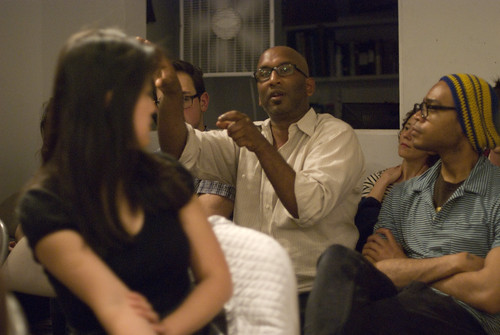3D funds for Capilano University
odard, Miéville & Lynne Sachs: Movie-making and the Stubborn, Unruly Galaxy of Childhood

Image by uniondocs
Leave it to Jean-Luc Godard and Anne Marie Miéville to figure out how to use television to reveal the latent brilliance of a child. Created for French television during the radical days of the late 1970s , “France/tour/detour/deux enfant” (1978) is an intimate, provocative and quotidian video essay that uses avant-garde cinema’s techniques in a visual experiment that will change anyone’s perception of the developing mind of a human being.
Tonight Lynne Sachs will discuss the way that “France/tour…” influenced her own work as she reflects on the presence of childhood in her twenty-year film career. Beginning in her early twenties when the ambiguity of femininity seemed daunting and problematic to more recent years when motherhood has given her quick access to the conundrums of youth, Sachs, like Godard and Melville, ponders her relationship as an artist to this unavoidable eighteen year odyssey. Sachs will screen Photograph of Wind (3 min., 2001), Atalanta: 32 Years Later (5 min. 2006), and The Last Happy Day (38 min.) in their entirety along with brief scenes from The House of Science (1991) and Wind in Our Hair (2010).
Program:
France/Tour/Detour/Deux Enfants by Jean Luc Godard and Ann Marie Miéville
(excerpt from 12 part TV series, 1977, France)
Godard and Miéville take a detour through the everyday lives of two children in contemporary France. Sachs will present excerpts from the series.
Photograph of Wind by Lynne Sachs
(4 min.,16mm, b&w and color, 2001)
“My daughter’s name is Maya. I’ve been told that the word maya means illusion in Hindu philosophy. As I watch her growing up, spinning like a top around me, I realize that her childhood is not something I can grasp but rather – like the wind – something I feel tenderly brushing across my cheek.” (Lynne Sachs)
“Sachs suspends in time a single moment of her daughter.” Fred Camper, Chicago Reader
Atalanta: 32 Years Later by Lynne Sachs
(5 min. color sound, 16mm to video, 2006)
A retelling of the age-old fairy tale of the beautiful princess in search of the perfect prince. In 1974, Marlo Thomas’ hip, liberal celebrity gang created a feminist version of the children’s parable for mainstream TV’s “Free To Be You and Me”. Now in 2006, Sachs dreamed up this new experimental film reworking, a homage to girl/girl romance.
“Very gentle and evocative of foreign feelings.” George Kuchar
The Last Happy Day by Lynne Sachs
( 38 min. 2009)
The Last Happy Day is an experimental documentary portrait of Sandor (Alexander) Lenard, a Hungarian medical doctor and a distant cousin of filmmaker Lynne Sachs. In 1938 Lenard, a writer with a Jewish background, fled the Nazis to a safe haven in Rome. Shortly thereafter, the U.S. Army Graves Registration Service hired Lenard to reconstruct the bones — small and large — of dead American soldiers. Eventually he found himself in remotest Brazil where he embarked on the translation of “Winnie the Pooh” into Latin, an eccentric task that catapulted him to brief world-wide fame. Sachs’ essay film uses personal letters, abstracted war imagery, home movies, interviews, and a children’s performance to create an intimate meditation on the destructive power of war.
“A fascinating, unconventional approach to a Holocaust-related story … a frequently charming work that makes no effort to disguise an underlying melancholy.” George Robinson, The Jewish Week
Excerpts from:
The House of Science: A Museum of False Facts
(30 min., 16mm,1991)
“Throughout The House of Science an image of a woman, her brain revealed, is a leitmotif. It suggests that the mind/body split so characteristic of Western thought is particularly troubling for women, who may feel themselves moving between the territories of the film’s title –house, science, and museum, or private, public and idealized space — without wholly inhabiting any of them. This film explores society’s representation and conceptualization of women through home movies, personal reminiscences, staged scenes, found footage and voice. Sachs’ personal memories recall the sense of her body being divided, whether into sexual and functional territories, or ‘the body of the body’ and ‘the body of the mind.’” (Kathy Geritz, Pacific Film Archive)
Wind in Our Hair/Con viento en el pelo
(16mm, Super 8 and digital on video, English and Spanish, 2010)
“Inspired by the writings of Julio Cortázar, whose work not only influenced a generation of Latin American writers but film directors such as Antonioni and Godard, Lynne Sachs’ Wind in Our Hair/Con viento en el pelo is an experimental narrative that explores the interior and exterior worlds of four early-teens, and how through play they come to discover themselves and their world. “Freedom takes us by the hand–it seizes the whole of our bodies,” a young narrator describes as they head towards the tracks. This is their kingdom, a place where–dawning fanciful masks, feather boas, and colorful scarves — the girls pose as statues and perform for each other and for passengers speeding by.”
– Carolyn Tennant, Media Arts Director, Hallwalls Contemporary Arts Center, Buffalo, New York
“Wind in Our Hair moves from childhood’s earthbound, cloistered spaces, into the skittering beyond of adolescence, exploding with anticipation and possibility.” Todd Lillethun, Artistic Director, Chicago Filmmakers
Program Run Time: 119 minutes
Lynne Sachs makes films, videos, installations and web projects that explore the intricate relationship between personal observations and broader historical experiences by weaving together poetry, collage, painting, politics and layered sound design. Since 1994, her five essay films have taken her to Vietnam, Bosnia, Israel and Germany — sites affected by international war–where she tries to work in the space between a community’s collective memory and her own subjective perceptions. Strongly committed to a dialogue between cinematic theory and practice, Lynne searches for a rigorous play between image and sound, pushing the visual and aural textures in her work with each and every new project. Since 2006, she has collaborated with her partner Mark Street in a series of playful, mixed-media performance collaborations they call The XY Chromosome Project. In addition to her work with the moving image, Lynne co-edited the 2009 Millennium Film Journal issue on “Experiments in Documentary”. Supported by fellowships from the Rockefeller and Jerome Foundations and the New York State Council on the Arts, Lynne’s films have screened at the Museum of Modern Art, the New York Film Festival, the Sundance Film Festival and recently in a five film survey at the Buenos Aires Film Festival. In 2010, the San Francisco Cinematheque will present a full retrospective of her work. Lynne teaches experimental film and video at New York University and lives in Brooklyn.
Josetxo Cerdán Los Arcos is an assistant professor at the URV and the artistic director of Punto de Vista. He has edited the books ‘Mirada, Memoria y Fascinación’ (2001); ‘Documental y Vanguardia’ (2005); ‘Al Otro Lado de la Ficción’ (2007); and ‘Suevia Films-Caesáreo González’ (2005); ‘Signal Fires: The Cinema of Jem Cohen’ (2010). He is author of ‘Ricardo Urgoiti. Los trabajos y los días’ (2007). He has coordinated an M. A. in from 1998 to 2008. Principal interest areas are non-fiction film, Spanish cinema, and television.
Kelly Anderson is an award-winning independent producer and director of documentary and narrative films. Her most recent production is NEVER ENOUGH, a documentary about American’s relationship with their material possessions, which is premiering at the 2010 Big Sky Documentary Film Festival. Other recent directing work includes SOMEPLACE LIKE HOME, a documentary about the redevelopment of Fulton Mall in Downtown Brooklyn, which she made for FUREE (Families United for Racial and Economic Equality). In 2004 Kelly produced and directed (with Tami Gold) and edited EVERY MOTHER’S SON, a documentary for ITVS about mothers whose children have been killed by police officers and who have become national spokespeople on the issue of police brutality. EVERY MOTHER’S SON premiered at Tribeca Film Festival, where it won the Audience Award, and had its broadcast premiere on PBS’s P.O.V. series. Kelly produced, directed and edited OVERCOMING THE ODDS, a short documentary that was distributed to more than 2,500 people internationally as part of a successful campaign to pass the groundbreaking Framework Convention on Tobacco Control, which set global standards on the promotion and marketing of tobacco. This film was a follow-up to MAKING A KILLING, a half-hour documentary Kelly produced and directed (with Tami Gold) and edited that addresses the marketing practices of the tobacco industry in the developing world. MAKING A KILLING premiered at the Slamdance Film Festival, was screened for delegates at the World Health Organization and aired on television in Nigeria, Serbia, Lagos and Vietnam. In 2000 Kelly completed SHIFT, a one-hour drama for ITVS about the volatile relationship between a North Carolina waitress and a telemarketing prison inmate, which premiered at the Rotterdam International Film Festival and aired on many PBS stations. Kelly’s other documentaries include OUT AT WORK (with Tami Gold), which was screened at the 1997 Sundance Film Festival and was shown on HBO. She is an Associate Professor in the Department of Film and Media Studies at Hunter College in New York City.
3D funds for Capilano University
MINISTER of State Lynne Yelich (left) and Capilano University president Kris Bulcroft listen to Bosa Centre director Bill Thumm at a funding announcement Feb. 24.
Read more on North Shore News
